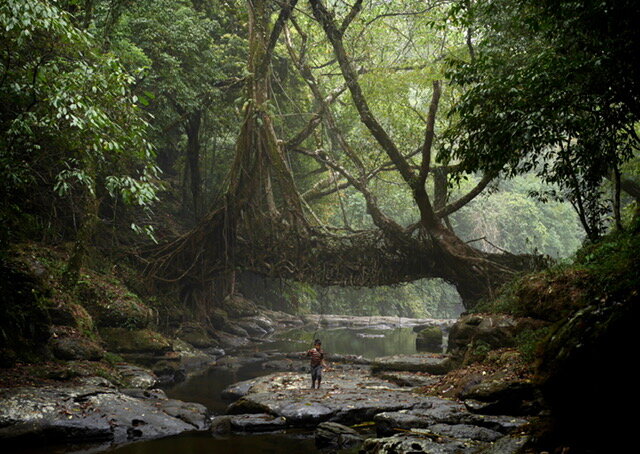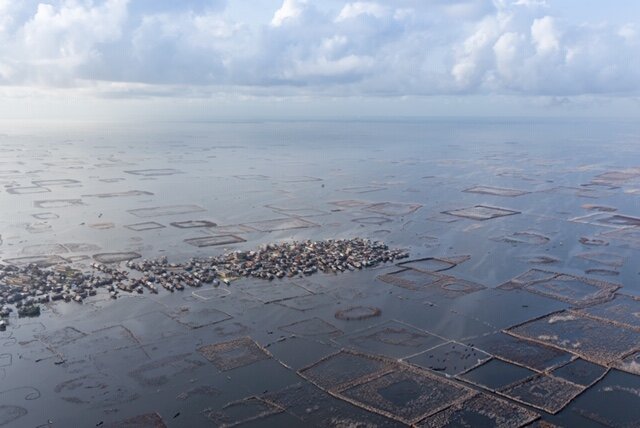On Wednesday, September 23rd, please join the Harvard Alumni Architectural and Urban Society to hear Julia Watson, Urban Design Critic at Harvard University and Columbia University, speak about her latest book, Lo-TEK. Design by Radical Indigenism (TASCHEN, January 18, 2020).
Three hundred years ago, intellectuals of the European Enlightenment constructed a mythology of technology. Influenced by a confluence of humanism, colonialism, and racism, this mythology ignored local wisdom and indigenous innovation, deeming it primitive. Today, we have slowly come to realize that the legacy of this mythology is haunting us.
Designers understand the urgency of reducing humanity’s negative environmental impact, yet perpetuate the same mythology of technology that relies on exploiting nature. Responding to climate change by building hard infrastructures and favoring high-tech homogenous design, we are ignoring millennia old knowledge of how to live in symbiosis with nature. Without implementing soft systems that use biodiversity as a building block, designs remains inherently unsustainable.
Lo—TEK, derived from Traditional Ecological Knowledge, is a cumulative body of multigenerational knowledge, practices, and beliefs, countering the idea that indigenous innovation is primitive and exists isolated from technology. It is sophisticated and designed to sustainably work with complex ecosystems.
In four chapters—Mountains, Forests, Deserts, and Wetlands—Watson’s book explores thousands of years of human wisdom and ingenuity from places like Peru, the Philippines, Tanzania, Kenya, Iran, Iraq, India, and Indonesia. We rediscover an ancient mythology in a contemporary context, radicalizing the spirit of human nature.
The editor and author: Academic and author Julia Watson is the Principal and Founder of Julia Watson Studio, an experiential, landscape, and urban design studio, as well as a Director and Co-Founder of ‘A Future Studio’, a collective of conscious designers with an ethos towards global ecological change. She teaches Urban Design at Harvard and Columbia University. After graduating from Harvard with the highest award for her work on conservation and spiritual landscapes, she has been published in Nakhara Journal, Water Urbanisms East, World Heritage Sites and Living Culture of Indonesia, and co-authored the Spiritual Guide to Bali’s UNESCO World Heritage with Dr. J. Stephen Lansing.
The designers: Piera Wolf and Claudine Eriksson are W—E studio, a multidisciplinary creative studio based in Zürich and New York that strives to bridge time and space between these constantly evolving and contrasting cities. Piera and Claudine have individually been recognized by publications and organizations including The New York Times, Dazed Digital, Rolling Stone, Slanted, and many more. Talks, teaching, and workshop engagements include the New York School of Visual Arts, HTW Berlin, Google Creative Lab, and the Zürich University of the Arts.
"Half a century ago, Rudofsky took us around the globe in Architecture without Architects. Today, Julia Watson invites us to reframe our future through the wisdom of indigenous design. Lo—TEK is landscape architecture without landscape architects." ― Bjarke Ingels
Julia Watson
Designer, activist, academic and author, Julia is a leading expert on indigenous technologies, as seen in her book Lo-TEK, Design by Radical Indigenism, published by Taschen. She teaches at Harvard and Columbia while also leading an experiential, landscape, and urban design studio: Julia Watson with Marie Salembier. After graduating from Harvard with the highest award for her work on conservation and spiritual landscapes, she has been widely published and co-authored the Spiritual Guide to Bali’s UNESCO World Heritage with Dr. J. Stephen Lansing. Julia approaches design as a “rewilding,” with a portfolio of projects including the Reef Resilience Initiative with the Great Barrier Reef Foundation, private estates with the owners of PACE Galleries, and the artist Rashid Johnson. She is a fellow of Summit REALITY & Pop!tech, received a Christensen Fund for her work in conserving Bali’s first UNESCO World Heritage site, and was a Disruptive By Design Ambassador for WIRED. Lo-TEK has featured in The New York Times, The Guardian, The Washington Post and Fast Company. Born in Australia, she regularly travels to sacred sites and indigenous cultures across the globe.
EVENT DETAILS
Wednesday, September 23, 2020 from 5:00 PM to 6:30 PM EDT
This is a webinar on Zoom. Please register using the link below. You will receive an email shortly before the event date with a URL to join this online event.



